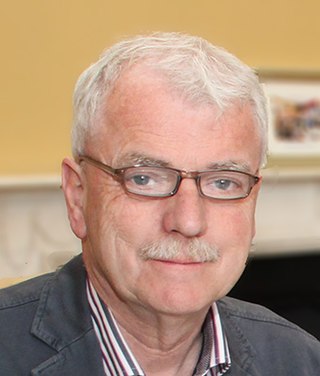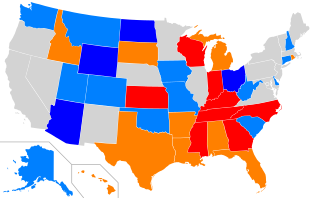Related Research Articles

An election is a formal group decision-making process by which a population chooses an individual or multiple individuals to hold public office.

The 1836 United States presidential election was the 13th quadrennial presidential election, held from Thursday, November 3 to Wednesday, December 7, 1836. In the third consecutive election victory for the Democratic Party, incumbent Vice President Martin Van Buren defeated four candidates fielded by the nascent Whig Party.

In United States politics, a swing state is any state that could reasonably be won by either the Democratic or Republican candidate in a statewide election, most often referring to presidential elections, by a swing in votes. These states are usually targeted by both major-party campaigns, especially in competitive elections. Meanwhile, the states that regularly lean to a single party are known as "safe states", as it is generally assumed that one candidate has a base of support from which a sufficient share of the electorate can be drawn without significant investment or effort by the campaign.

In political science, voter turnout is the participation rate of a given election. This is typically either the percentage of registered voters, eligible voters, or all voting-age people. According to Stanford University political scientists Adam Bonica and Michael McFaul, there is a consensus among political scientists that "democracies perform better when more people vote."

A civil war has been going on in Syria since 2011, following the events of the 2011 Syrian Revolution, which was part of the international wave of protest known as the Arab Spring. The government, headed by Bashar al-Assad, son of previous leader Hafez al-Assad, is based in Damascus, the traditional capital. The Ba'athist government conducts Presidential elections and parliamentary elections to the People's Assembly.

Finian McGrath is an Irish former independent politician who served as Minister of State for Disability Issues from 2016 to 2020. He served as a Teachta Dála (TD) from 2002 to 2020.

The paradox of voting, also called Downs' paradox, is that for a rational and egoistic voter, the costs of voting will normally exceed the expected benefits. Because the chance of exercising the pivotal vote is minuscule compared to any realistic estimate of the private individual benefits of the different possible outcomes, the expected benefits of voting are less than the costs. Responses to the paradox have included the view that voters vote to express their preference for a candidate rather than affect the outcome of the election, that voters exercise some degree of altruism, or that the paradox ignores the collateral benefits associated with voting besides the resulting electoral outcome.

The Democracy Index published by the Economist Group is an index measuring the quality of democracy across the world. This quantitative and comparative assessment is centrally concerned with democratic rights and democratic institutions. The methodology for assessing democracy used in this democracy index is according to Economist Intelligence Unit which is part of the Economist Group, a UK-based private company, which publishes the weekly newspaper The Economist. The index is based on 60 indicators grouped into five categories, measuring pluralism, civil liberties, and political culture. In addition to a numeric score and a ranking, the index categorizes each country into one of four regime types: full democracies, flawed democracies, hybrid regimes, and authoritarian regimes. The first Democracy Index report was published in 2006. Reports were published every two years until 2010 and annually thereafter. The index includes 167 countries and territories, of which 166 are sovereign states and 164 are UN member states. Other democracy indices with similar assessments of the state of democracy include V-Dem Democracy indices or Bertelsmann Transformation Index.
Electoral reform in North Carolina refers to efforts to change the voting and election laws in the Tar Heel State.

Pippa Norris is a British American political scientist specializing in comparative politics. She is the McGuire Lecturer in Comparative Politics at the Harvard Kennedy School at Harvard University, and she has served as the Australian Laureate Fellow and Professor of Government and International Relations at the University of Sydney, and Director of the Electoral Integrity Project.

Like most U.S. states, North Carolina is politically dominated by the Democratic and Republican political parties. North Carolina has 14 seats in the U.S. House of Representatives and two seats in the U.S. Senate. North Carolina has voted for the Republican candidate in all but one presidential election since 1980; the one exception was in 2008, when a plurality of North Carolinians voted for Barack Obama. However, since that election, the state has remained closely contested with Republicans winning by no more than four points and obtaining a majority of the vote only in 2012. This stands in contrast to the post-Civil War era, as the state was a strongly Democratic Solid South state from 1880 to 1964, only voting Republican in 1928.

Susan A. Gelman is currently Heinz Werner Distinguished University Professor of psychology and linguistics and the director of the Conceptual Development Laboratory at the University of Michigan. Gelman studies language and concept development in young children. Gelman subscribes to the domain specificity view of cognition, which asserts that the mind is composed of specialized modules supervising specific functions in the human and other animals. Her book The Essential Child is an influential work on cognitive development.

Andrew Eric Gelman is an American statistician and professor of statistics and political science at Columbia University.
Andrew Stephen Reynolds is an author and professor of political science at University of North Carolina. Reynolds is a specialist in democratization, electoral system design, constitutional design, minority rights and ethnic conflict.
Anocracy, or semi-democracy, is a form of government that is loosely defined as part democracy and part dictatorship, or as a "regime that mixes democratic with autocratic features". Another definition classifies anocracy as "a regime that permits some means of participation through opposition group behavior but that has incomplete development of mechanisms to redress grievances." The term "semi-democratic" is reserved for stable regimes that combine democratic and authoritarian elements. Scholars distinguish anocracies from autocracies and democracies in their capability to maintain authority, political dynamics, and policy agendas. Anocratic regimes have democratic institutions that allow for nominal amounts of competition. Such regimes are particularly susceptible to outbreaks of armed conflict and unexpected or adverse changes in leadership.

Voter ID laws in the United States are laws that require a person to provide some form of official identification before they are permitted to register to vote, receive a ballot for an election, or to actually vote in elections in the United States.
Electoral integrity refers to the fairness of the entire voting process and how well the process protects against election subversion, voter suppression, and other threats to free and fair elections. The consequences of unfree or unfair elections can include doubts in the legitimacy of the outcome, loss of faith in the democratic system, and reduced future participation.
General elections were held in Ethiopia on 24 May 2015 to elect officials to the House of Peoples' Representatives. Regional Assembly elections were also held on this date.
Ballot collecting, also known as "ballot harvesting" or "ballot chasing", is the gathering and submitting of completed absentee or mail-in voter ballots by third-party individuals, volunteers or workers, rather than submission by voters themselves directly to ballot collection sites. It occurs in some areas of the U.S. where voting by mail is common, but some other states have laws restricting it.
Contested elections in American history at the presidential level involve serious allegations by top officials that the election was "stolen." Such allegations appeared in 1824, 1876, 1912, 1960, 2000, and 2020. Typically, the precise allegations change over time.
References
- ↑ Norris, Pippa (March 29, 2016). "Opinion: U.S. elections ranked worst among Western democracies. Here's why". The Washington Post.
- ↑ "Leadership Team". The Electoral Integrity Project. 4 November 2021. Archived from the original on 2021-05-31.
- ↑ Hamze, Adam (24 December 2016). "North Carolina's Democracy Ranked on Par with Cuba". HuffPost .
- ↑ Reynolds, Andrew (December 31, 2016). "Opinion: North Carolina is no longer classified as a democracy". The News & Observer .
- ↑ Fausset, Richard; Martin, Jonathan (23 December 2016). "Battle Lines Turn North Carolina's Moderation Into a Distant Memory". The New York Times.
- ↑ White, Kaila (December 28, 2016). "Arizona the worst for electoral integrity, experts say". The Arizona Republic (USA Today). Retrieved 30 December 2016.
Those indicators were interpreted into a 100-point scale. Arizona scored a total of 53, while the best state, Vermont, scored 75.
- ↑ "Opinion: North Carolina's Iron Curtain". The Wall Street Journal. 30 December 2016. Retrieved 31 December 2016.
- ↑ Matthews, Dylan (27 December 2016). "Political scientist: North Carolina "can no longer be classified as a full democracy"". Vox. Retrieved 31 December 2016.
- ↑ Norris, Pippa; Coma, Martinez i; Grömping, Max (18 February 2015). "The Year in Elections, 2014". Social Science Research Network. SSRN 2567075.
- ↑ Gelman, Andrew (2 January 2017). "About that bogus claim that North Carolina is no longer a democracy . . ". Statistical Modeling, Causal Inference, and Social Science.
- ↑ Gelman, Andrew (4 January 2017). "The Bad Research Behind the Bogus Claim That North Carolina Is No Longer a Democracy". Slate. Retrieved 5 January 2017.
- ↑ Gelman, Andrew (2 January 2017). ""Constructing expert indices measuring electoral integrity" - reply from Pippa Norris - Statistical Modeling, Causal Inference, and Social Science". Statistical Modeling, Causal Inference, and Social Science.